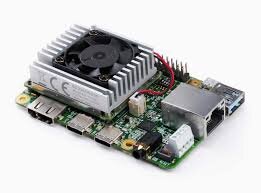The Google Coral Dev Board is a powerful single-board computer designed for rapid prototyping of machine learning applications at the edge[1][2]. At its core lies the Google Edge TPU (Tensor Processing Unit) coprocessor, capable of performing 4 trillion operations per second (TOPS) with impressive power efficiency of 2 TOPS per watt[2][4].
This development board runs Mendel Linux, a Debian-based operating system, allowing developers to leverage familiar Linux tools and environments[2][4]. The board’s key specifications include:
- NXP i.MX 8M SoC with quad-core Arm Cortex-A53 CPU and Cortex-M4F microcontroller
- Integrated GC7000 Lite Graphics GPU
- 1 GB or 4 GB LPDDR4 RAM
- 8 GB eMMC storage and a microSD slot
- Wi-Fi 802.11b/g/n/ac and Bluetooth 4.2 connectivity
- Various I/O options including USB, HDMI, Ethernet, and GPIO pins[4]
The Coral Dev Board excels at running TensorFlow Lite models, which can be compiled specifically for the Edge TPU[2]. This capability enables developers to deploy and run state-of-the-art mobile vision models like MobileNet v2 at nearly 400 frames per second[4].
One of the board’s standout features is its modularity. The System-on-Module (SoM) containing the Edge TPU can be removed from the baseboard, allowing developers to transition seamlessly from prototype to production by integrating the SoM into custom hardware designs[2][4].
For those interested in exploring on-device machine learning, the Google Coral Dev Board offers a compelling platform that combines powerful ML inferencing capabilities with the flexibility of a Linux-based single-board computer[1][2][4].
Further Reading
1. Get started with the Dev Board | Coral
2. Google Coral Dev Board, 137.00 €
3. Google Coral Dev Board Mini | The Pi Hut
4. Dev Board | Coral
5. Google Coral Dev Board Unpacking, Hardware Overview and a Look Inside the SoM – YouTube


